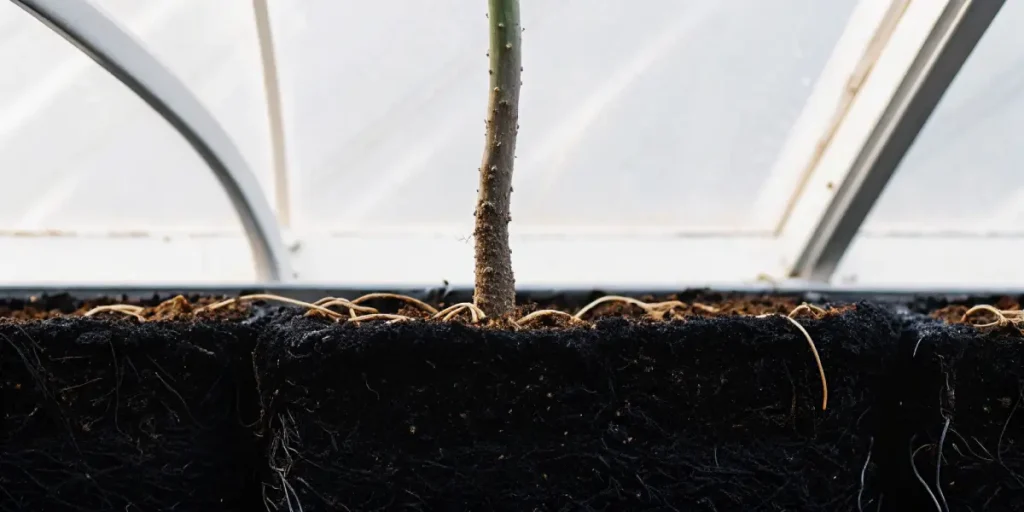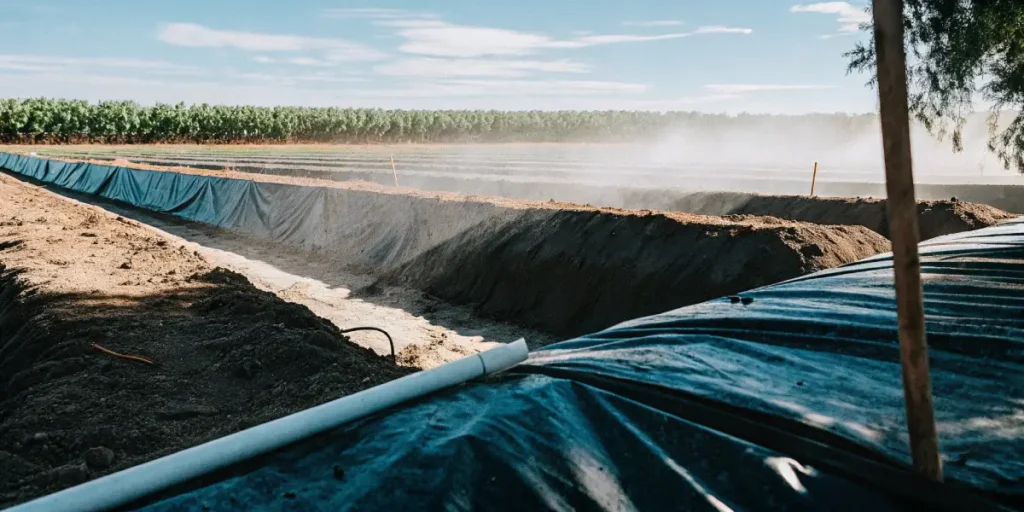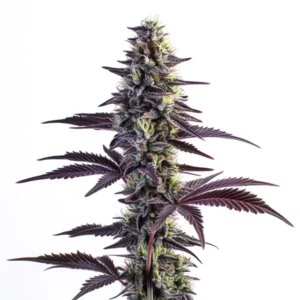
How Cannabis Roots Affect Soil
When growing cannabis, it’s vital to know how cannabis roots affect soil. These roots do more than anchor the plant; they engage in a complex dance with the soil. For first-time growers and seasoned pros alike, knowing this interaction can boost your yields.
Cannabis roots affect the soil structure by breaking it up, making it easier for water and nutrients to penetrate. This is crucial for healthy plant growth. If you’ve ever wondered why your plants seem to thrive after a good rain, thank the roots for their role in allowing water to reach deep into the soil.
Recommended Strains
Purple Lemonade Autoflower
|
|
THC | 20% - 22% (Medium) |
|
|
Type | Autoflowering |
|
|
Yield | Medium |
|
|
Phenotype | 70% Indica / 30% Sativa |
Illemonati
|
|
THC | 23% - 25% (High) |
|
|
Type | Feminized |
|
|
Yield | High |
|
|
Phenotype | 70% Indica / 30% Sativa |
Roots also play a key role in nutrient cycling. This means they help transform nutrients in the soil into forms the plant can absorb. Without this process, your cannabis plants could struggle to get the essentials they need to grow strong and healthy.
Effects of Cannabis Roots on Soil Health
The effects of cannabis roots on soil health are profound. Roots release organic compounds that feed beneficial soil organisms. These organisms, in turn, help break down organic matter, enriching the soil. This is a win-win for your cannabis plants and the environment.
Another aspect of soil health is aeration. Cannabis roots create pathways in the soil, improving its structure. This allows air to circulate, which is vital for root respiration and the overall health of the soil microbiome. When the soil breathes, your plants breathe easier too.
Healthy soils are the backbone of successful gardening, and knowing how cannabis roots affect soil can elevate your gardening practices. By improving soil health, these roots contribute to a sustainable growing environment. This ensures that your plants are not only healthier but also more productive over time.
The organic compounds released by the roots can also suppress soil-borne pathogens. This natural defense mechanism offers an added layer of protection for your plants, reducing the need for chemical interventions. As a result, your garden becomes a more resilient ecosystem.
Root Interactions with Soil Microbiome
Let’s dive deeper into cannabis root interactions with the soil microbiome. The soil microbiome is a community of microorganisms living in the soil. These include bacteria, fungi, and other tiny critters that you can’t see with the naked eye.
Cannabis roots release sugars and other compounds that attract beneficial bacteria and fungi. This relationship is mutual. The microbes break down nutrients that are otherwise inaccessible to the plant, and in return, they get food from the plant roots.
Knowing cannabis root interactions with the soil microbiome can significantly enhance your gardening outcomes. By fostering a thriving microbial community, cannabis roots ensure that plants receive a balanced diet of nutrients. This symbiosis can lead to faster growth and increased resilience against stress factors.
Moreover, a rich soil microbiome can improve plant immunity. The presence of diverse microorganisms helps in the production of natural antibiotics, which can ward off harmful pathogens. This creates a self-sustaining environment where plants flourish naturally.
Promos & Deals
Impact of Cannabis Roots on Soil Structure
Roots impact soil structure significantly. As they grow, they create channels within the soil. These channels are crucial for water movement and root expansion. When the soil structure is well-maintained, it supports robust plant growth.
Have you ever tried planting in compacted soil? It’s tough. Cannabis roots naturally aerate the soil, reducing compaction. This improves the soil’s capacity to retain moisture and nutrients, making your growing efforts more rewarding.
The impact of cannabis roots on soil structure is transformative. As these roots navigate through the soil, they enhance its ability to support plant life. This not only benefits the current crop but also improves conditions for future plantings.
By reducing soil compaction, cannabis roots enhance root penetration for subsequent plants. This minimizes the energy plants need to expend in breaking through tough soil, allowing them to focus more on growth and production. It’s a sustainable way to maintain soil vitality.

Role of Cannabis Roots in Soil Nutrient Cycling
Soil nutrient cycling is a critical process in any garden. Cannabis roots play a pivotal role here. They help break down organic matter, turning it into nutrients the plant can use. This process is essential for maintaining soil fertility over time.
Consider the strain OG Kush. Known for its vigorous growth, its roots actively participate in nutrient cycling, helping your soil remain fertile longer.
The function of cannabis roots in soil nutrient cycling cannot be overstated. They convert organic materials into accessible forms, ensuring that plants have a steady supply of essential nutrients. This process is crucial for the continuous regeneration of soil fertility.
Incorporating organic fertilizers can further enhance this nutrient cycling. Cannabis roots efficiently process these inputs, minimizing waste and maximizing plant uptake. This eco-friendly approach to gardening supports both plant health and environmental sustainability.
Cannabis Roots Influence on Soil pH Levels
Soil pH levels can make or break a growing season. Cannabis roots influence soil pH by releasing acids or bases that adjust the soil environment. This is crucial because different nutrients are available at different pH levels.
For instance, if your soil is too alkaline, cannabis roots can release organic acids to lower the pH. Strains like Critical are known for their ability to thrive in various pH conditions, showcasing the adaptability of cannabis roots.
Knowing how cannabis roots influence soil pH levels can give you an edge in managing soil conditions. By naturally adjusting pH levels, cannabis roots ensure optimal nutrient availability, which is key to robust plant growth.
This natural regulation of soil pH can reduce the need for chemical amendments. By relying on the roots’ intrinsic ability to adjust soil chemistry, you can maintain a more organic and eco-friendly gardening practice, benefiting both your plants and the surrounding ecosystem.

FAQs
Do cannabis roots improve soil fertility?
Yes, cannabis roots significantly improve soil fertility. They enhance soil structure and nutrient availability. By breaking down organic matter, they enrich the soil with nutrients that are vital for plant growth. This natural process reduces the need for synthetic fertilizers.
Additionally, the roots promote the growth of beneficial microorganisms. These organisms further decompose organic materials, maintaining a healthy and fertile soil environment. This ongoing cycle supports long-term soil health and productivity.
The continuous activity of cannabis roots in nutrient cycling enhances soil fertility over time. As they break down organic matter, they release nutrients slowly, providing a steady nutrient supply. This process is vital for sustaining plant health and productivity without relying heavily on artificial inputs.
Furthermore, the diverse microbial life supported by cannabis roots contributes to a dynamic and balanced soil ecosystem. This biodiversity enhances nutrient breakdown and availability, leading to more vigorous plant growth and increased yields in the long term.
Can cannabis roots help with soil erosion?
Indeed, cannabis roots can help mitigate soil erosion. Their extensive root systems hold soil particles together, reducing the chances of erosion. This is particularly useful on slopes or in areas prone to heavy rainfall.
The roots also improve soil structure by creating channels for water to infiltrate. This reduces surface runoff, further decreasing erosion risks. By incorporating cannabis plants into your garden, you contribute to soil conservation efforts.
By knowing how cannabis roots affect soil, particularly in terms of erosion prevention, growers can make informed decisions about crop placement and soil management. The robust root systems provide a natural barrier against soil displacement, especially in vulnerable areas.
Coupled with other erosion control measures, such as mulching and cover crops, cannabis roots offer an effective strategy for maintaining soil integrity. This not only protects the land but also enhances its productivity, ensuring long-term agricultural success.
How do cannabis roots affect soil microbes?
Cannabis roots have a symbiotic relationship with soil microbes. They release compounds that attract beneficial bacteria and fungi, which assist in breaking down nutrients. This interaction enhances nutrient availability for the plant.
Healthy root systems, like those of certain Blimburn Seeds strains, support a thriving microbial community. This improves soil health and plant growth, creating a balanced ecosystem within your garden.
Exploring cannabis root interactions with the soil microbiome reveals a complex web of mutual benefits. The roots provide necessary food sources for microbes, while the microbes enhance nutrient availability, forming a cycle of growth and sustainability.
This symbiotic relationship not only boosts plant health but also contributes to a more resilient garden ecosystem. By promoting microbial diversity, cannabis roots help create a robust environment that can withstand various stressors, from pests to diseases.
What impact do cannabis roots have on water retention?
Cannabis roots positively impact soil water retention. Their growth creates pathways that improve soil structure, allowing it to hold water more effectively. This means less frequent watering and more consistent moisture for your plants.
The roots also reduce soil compaction, enhancing water infiltration. By promoting better water retention, cannabis roots help maintain an optimal growing environment, even during dry spells.
The impact of cannabis roots on soil structure extends to enhanced water retention capabilities. As they create networks of channels, these roots enable the soil to absorb and hold water more efficiently, reducing the need for constant irrigation.
This improved water management is crucial for maintaining plant health, particularly in regions prone to drought. By ensuring your plants have access to consistent moisture, cannabis roots contribute to a more stable and productive growing environment.
Can cannabis roots alter soil texture?
While cannabis roots do not change soil texture directly, they influence its structure. By creating a network of channels, they allow for better aeration and drainage. This can make sandy soils more cohesive and clay soils more friable.
This indirect alteration of soil texture can significantly impact plant health. Improved structure leads to better root growth, nutrient uptake, and overall plant vitality, making your gardening efforts more successful.
As cannabis roots grow and expand, they inadvertently enhance the soil’s physical properties. This impact on soil structure can lead to easier root penetration and more effective nutrient and water uptake for plants.
By addressing issues like compaction and poor drainage through natural means, cannabis roots promote a healthier growing medium. This adaptation is vital for optimizing plant growth and ensuring a successful harvest, making these roots an invaluable part of sustainable gardening practices.




















